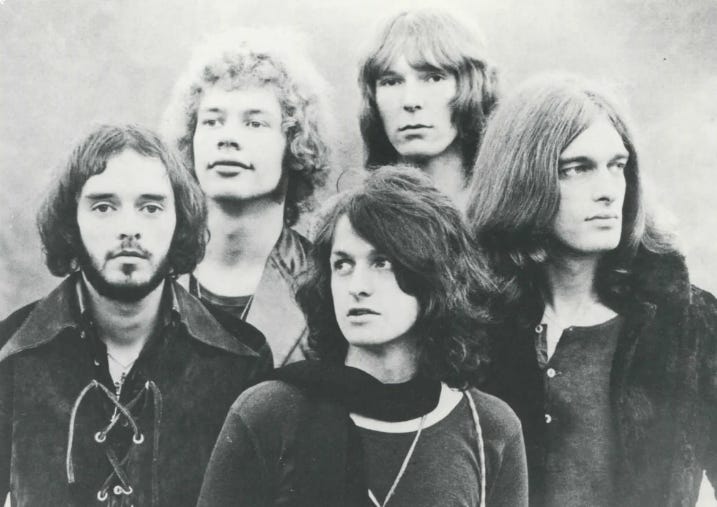Yes
Yes is a progressive rock band that emerged in the late 1960s and has since become one of the most enduring and influential acts in the genre.
The band's history is characterized by a revolving door of talented musicians, a commitment to musical innovation, and a catalog of albums that have left a lasting mark on the world of rock music.
Formation and Early Years (1968-1970):
Yes was formed in London, England, in 1968 by Jon Anderson (vocals), Chris Squire (bass), Peter Banks (guitar), Tony Kaye (keyboards), and Bill Bruford (drums). The band's original name was "Mabel Greer's Toyshop," but they quickly adopted the name "Yes." They started playing a mix of covers and original material, drawing inspiration from psychedelic and folk music. Yes's eponymous debut album, released in 1969, showcased their early sound, which was still rooted in traditional rock and featured a mix of cover songs and original compositions.
The addition of Steve Howe (guitar) and Rick Wakeman (keyboards) in 1970 marked a pivotal moment for the band. This lineup became known as the "classic" Yes lineup and was responsible for some of their most iconic work.
Classic Era (1971-1980):
Yes's second album, "Time and a Word" (1970), showcased their evolving sound and marked their transition into progressive rock. It featured orchestral arrangements and a more complex musical structure, setting the stage for their future successes.
The breakthrough came with the release of "Fragile" (1971) and "Close to the Edge" (1972). These albums are considered some of the finest in progressive rock history. "Fragile" introduced the world to the band's new keyboardist, Rick Wakeman, and included the hit single "Roundabout." "Close to the Edge" is a monumental work, featuring only three tracks, with the title track itself spanning over 18 minutes.
Yes continued to release critically acclaimed albums during the 1970s, including "Tales from Topographic Oceans" (1973), "Relayer" (1974), and "Going for the One" (1977). These albums pushed the boundaries of progressive rock and showcased the band's exceptional musicianship and complex compositions.
Changes in Lineup and Sound (1980-1983):
The early 1980s brought changes to Yes. Jon Anderson left the band, and they released the album "Drama" (1980) with Trevor Horn on vocals and Geoff Downes on keyboards. The album was a departure from their classic sound and marked a more pop-oriented phase.
In 1983, Yes disbanded, and members pursued various solo projects and new collaborations. This period saw the release of solo albums by Jon Anderson, Steve Howe, and others.
Reunion and Further Lineup Changes (1983-1991):
Yes reunited in 1983 with the "90125" album, which featured a new lineup, including Trevor Rabin (guitar), Tony Kaye returning on keyboards, Chris Squire, Alan White (drums), and a returning Jon Anderson on vocals. The album produced the hit single "Owner of a Lonely Heart" and marked a shift towards a more mainstream rock sound.
Yes continued to release albums and tour throughout the 1980s and early 1990s, including "Big Generator" (1987) and "Union" (1991), which saw a massive lineup with both classic and newer members.
Later Years (1991-Present):
Yes underwent further lineup changes and divisions among members. They have continued to release new music and tour with various lineups, including the return of Rick Wakeman and Jon Anderson in the early 2000s, resulting in albums like "The Ladder" (1999) and "Magnification" (2001).
The passing of Chris Squire in 2015 was a significant loss, as he had been the only constant member of Yes since its formation. Despite this, Yes has continued to tour and record new material with bassist Billy Sherwood taking on Squire's role.
Yes's legacy in progressive rock remains significant, and their catalog spans a wide range of musical styles, from symphonic and folk-infused rock to more radio-friendly pop-rock. Their technical prowess and intricate compositions have inspired countless musicians and bands, making them a cornerstone of progressive rock history.
In conclusion, Yes has experienced a long and diverse career marked by numerous lineup changes and shifts in musical direction. Through it all, they have remained a pioneering force in the world of progressive rock, leaving a lasting impact on the genre and continuing to be a beloved and respected name in the music industry.
